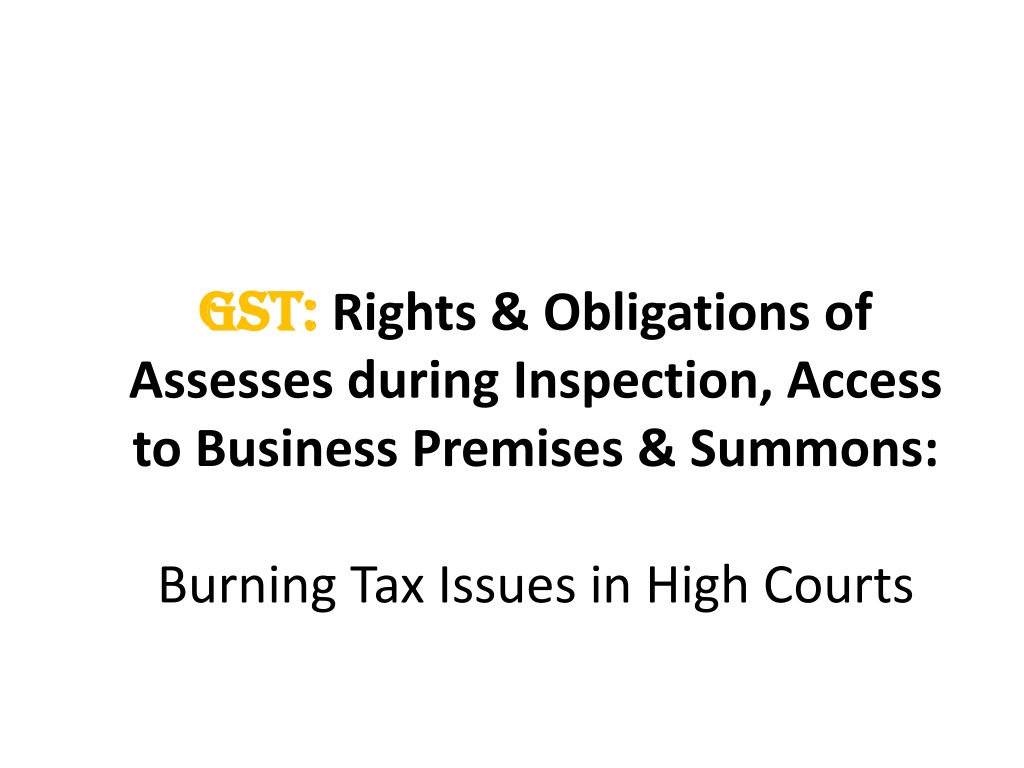

Replay
0 likes | 9 Vues
The process of inspection, search, and seizure in GST law is crucial for revenue authorities to combat tax evasion effectively. Inspection is a milder form of search involving authorized officers checking for tax evasion signs, while search allows access to premises for detailed investigation. Safeguards are in place to ensure fair exercise of power, including making a proper inventory of seized goods. Understanding these procedures is essential for both assesses and authorities to comply with legal obligations.

E N D
GST: GST: Rights & Obligations of Assesses during Inspection, Access to Business Premises & Summons: Burning Tax Issues in High Courts
INSPECTION • Power of Search and Seizure is investigation tool in the hands of revenue authorities, to gather evidences and unearth suppressed things and information so as to properly identify evasion of payment of tax and/ or contravention of any provisions of the law. • Section 67 provides for Inspection as well as Search & Seizure of goods. • Inspection is much softer version of Search & Seizure and are similar to Survey as enumerated under section 133A of the Income Tax Act 1961.
CIRCUMSTANCES FOR INITIATING INSPECTION An officer not below the rank of Joint Commissioner can authorise in writing an inspection if he has reasons to believe that has done one of the following: • i. suppressed any transaction of supply; • ii. suppressed stock of goods in hand; • iii. claimed excess input tax credit; • iv. contravened any provision of theAct/Rules to evade tax.
Authorisation can be given to an officer to carry out inspection of any of the following: i. any place registered/non-registered of business of a taxable person ii. any place of business of a person engaged in the business of transporting goods whether or not he is a registered taxable person iii. any place of business of an owner or an operator of a warehouse or a godown. [Section 67(1)] Inspection is a softer provision than search and seizure. 4
SEARCH It allows access to premises to verify whether evasion of tax has taken place. If inspection leads to a reason to believe that goods liable to confiscation or documents relevant for any proceedings are secreted at any place, the premises may be then searched. Search is more invasive than inspection Search warrant can be issued if Joint Commissioner has reasons to believe pursuant to an inspection or otherwise that goods liable to confiscation or any documents or books or things relevant to any proceedings are secreted in any place [Section 67(2)] 5
SEARCH Search issued if Joint Commissioner has reasons pursuant to an inspection or otherwise that goods liable to confiscation documents things relevant proceedings are secreted in any place [Section 67(2)] warrant can be to believe or any or any or books to 6
During search, the authorised officer can force open door of any premises and break open any almirah, box, electronic devices etc. in which he suspects that any goods, accounts or documents are concealed and access to which is denied 7
SEARCH The authorised officer can also seal the premises access is denied where the 8
SEARCH Where any goods, documents, books or things are liable for seizure under sub-section (2) of section 67, the proper officer or an authorised officer shall make an order of seizure in FORM GST INS-02. [Rule 139(2)] Where it is not practicable to seize any such goods, the proper officer or the authorised officer may serve on the owner or the custodian of the goods, an order of prohibition in FORM GST INS03 that he shall not remove, part with, or otherwise deal with the goods except with the previous permission of such officer. [Rule 139(4)] 9
SEARCH Certain safeguards are provided in respect of power of search and seizure. These are: Seized goods or documents should not be retained beyond the period necessary for their examination; Provisional release of seized goods upon execution of Bond and furnishing of sufficient security or on payment of applicable tax, interest and penalty 10
SEARCH Photocopies of the documents can be taken by the person from whose custody documents are seized; • For seized goods, if a notice is not issued within six months of its seizure, goods shall be returned to the person from whose possession it was seized- Period of six months can be extended on justified grounds up to a maximum period of six months by a proper officer i.e. Principal Commissioner /Commissioner. 11
SEARCH An inventory of seized goods shall be made by the seizing officer; Certain categories of goods to be specified by Notification(such perishable, hazardous nature goods etc.) can be disposed of immediately after seizure; as 12
SEARCH Certain observed during search: – basic guidelines to be No search of premises should be carried out without a valid search warrant issued by the proper officer. There should invariably be a lady officer accompanying team to a residence. the search The officers before starting search should disclose their identity by showing their identity cards to the person in-charge of the premises. the 13
SEARCH The search warrant should be executed before the start of the search by showing the same to the person in-charge of the premises and his signature should be taken on the body of the search warrant in token of having seen the same. The signatures of at least two witnesses should also be taken on the body of the search warrant. The search should be made in the presence of at least two independent witnesses of the locality. If no such inhabitants are available /willing, the inhabitants of any other locality should be asked to be witness to the search. The witnesses should be briefed about the purpose of the search. 14
SEARCH Both before the start of the search, and after its completion, the team of officers conducting the search and the accompanying witnesses should offer themselves for their personal search to the person in- charge of the premises being searched. A Panchnama / Mahazar of the proceedings of the search should necessarily be prepared on the spot. A list of all goods, documents seized/detained should be prepared and annexed to the Panchnama/Mahazar. recovered and 15
SEARCH The issuing authority of search warrant should maintain register of records of search warrant issued and the returned and used search warrants should be kept in records. A copy of the Panchnama / Mahazar along with its annexure should be incharge/owner of the premises being searched under acknowledgement. given to the person 16
SUMMONS Notices/summons Managing Director and senior officer should not be with threats or warning that they would be punished or prosecuted. Even when facts are to be ascertained and documents are required, personal presence of senior officer may not be necessary unless there are compelling reasons. The letters/notices must be appropriately worded. It should not intimidate and be minatory. [2018] 100 taxmann.com 307 (Delhi) requiring presence of the 17
BURNING ISSUES IN HIGH COURT Pending refund of ITC arising on account of export or inverted tax structure; Recredit of rejected refund of ITC arising on account of export or inverted tax structure; Interest or compensation on delayed refund of ITC arising on account of export or inverted tax structure; Challenge to vires of Rule 89(5) of the CGST Rules, which does not allow refund of ITC on input services and capital goods in the case of inverted tax structure Challenge to vires of Rule 89(4) of the CGST Rules, which does not allow refund of ITC on capital goods in the case of exports; 18
BURNING ISSUES IN HIGH COURT Constitutional validity of Notifications and Circulars levying GST after 01.03.2019 on development rights on unsold stock on the date of issue of completion certificate under reverse charge mechanism on the developer; Constitutional validity of Notifications and Circulars levying GST on development rights prior to 01.03.2019 on the landowner; Any issues arising out of technical glitches on the common portal. Constitutional validity of Section 16(2)(c) of the CGST Act which seeks to deny ITC to a buyer of goods or services, if the tax charged in respect of supply of goods or services has not been actually paid to the Government by the supplier of goods or services; 19
BURNING ISSUES IN HIGH COURT Demand for reversal of ITC under Section 16(4) of the CGST Act for credit availed after the due date of furnishing of the return under section 39 for the month of September following the end of financial year to which such invoice or debit note pertains or furnishing of the relevant annual return, whichever is earlier; Constitutional validity and vires of Section 43A(4) of the CGST Act and Rule 36(4) of the CGST Rules, to the extent that it seeks to restrict ITC available to a buyer of goods or services to the extent of 10% of the eligible credit, if invoices are not uploaded by the suppliers on the portal; 20
BURNING ISSUES IN HIGH COURT ITC blocked on portal by the department for non payment of tax or non filing of return by supplier; Constitutional validity of Section 28 of the Central Goods and Services Tax (Amendment) Act, 2018 which seeks to retrospectively disallow the transition and carry forward of CENVAT Credit of EC, SHEC and KKC into the GST regime. Freezing of bank accounts in the course of any enquiry/investigation proceedings. Notice demanding reversal of ITC for availing credit after date prescribed in Section 16 of the CGST Act. 21
